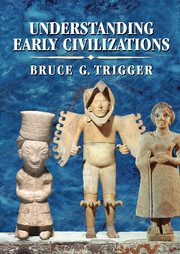Book contents
- Frontmatter
- Contents
- List of Illustrations
- Preface
- Understanding early civilizations
- Introduction
- Sociopolitical organization
- 5 Kingship
- 6 States : City and Territorial
- 7 Urbanism
- 8 Class Systems and Social Mobility
- 9 Family Organization and Gender Roles
- 10 Administration
- 11 Law
- 12 Military Organization
- 13 Sociopolitical Constants and Variables
- Economy
- Cognitive and symbolic aspects
- Discussion
- References
- Index
13 - Sociopolitical Constants and Variables
Published online by Cambridge University Press: 05 June 2014
- Frontmatter
- Contents
- List of Illustrations
- Preface
- Understanding early civilizations
- Introduction
- Sociopolitical organization
- 5 Kingship
- 6 States : City and Territorial
- 7 Urbanism
- 8 Class Systems and Social Mobility
- 9 Family Organization and Gender Roles
- 10 Administration
- 11 Law
- 12 Military Organization
- 13 Sociopolitical Constants and Variables
- Economy
- Cognitive and symbolic aspects
- Discussion
- References
- Index
Summary
The development of early civilizations appears inevitably to have produced monarchs; even in societies with patterns of dual leadership at lower levels there was a single preeminent ruler. The unity of the state seems to have been conceptualized by imagining the political, economic, legal, military, moral, and cosmological dimensions of society to be embodied in the person and will of a single human being. Kingship was viewed as inherited within kin groups; the Sumerians may have believed that it was conferred on individuals by the gods, but even for them kingship was hereditary in practice. The powers of kings, the roles they played, and the ways in which kingship was conceptualized varied considerably from one early civilization to another. In Egypt monarchs could exercise great personal influence, although doing so required considerable skill. Among the Yoruba, in contrast, kings had to share power with the leaders of important kin groups and sometimes were no more than figureheads. Kings were present in all early civilizations not so much because they were practically necessary as because kingship was a master concept in terms of which other, less comprehensible political relations could be understood and negotiated. The unity of states had to be achieved not only politically but also symbolically.
All early civilizations were based on the idea of social and economic inequality, which not only informed the understanding of society as a whole but also pervaded the family.
Information
- Type
- Chapter
- Information
- Understanding Early CivilizationsA Comparative Study, pp. 264 - 276Publisher: Cambridge University PressPrint publication year: 2003
